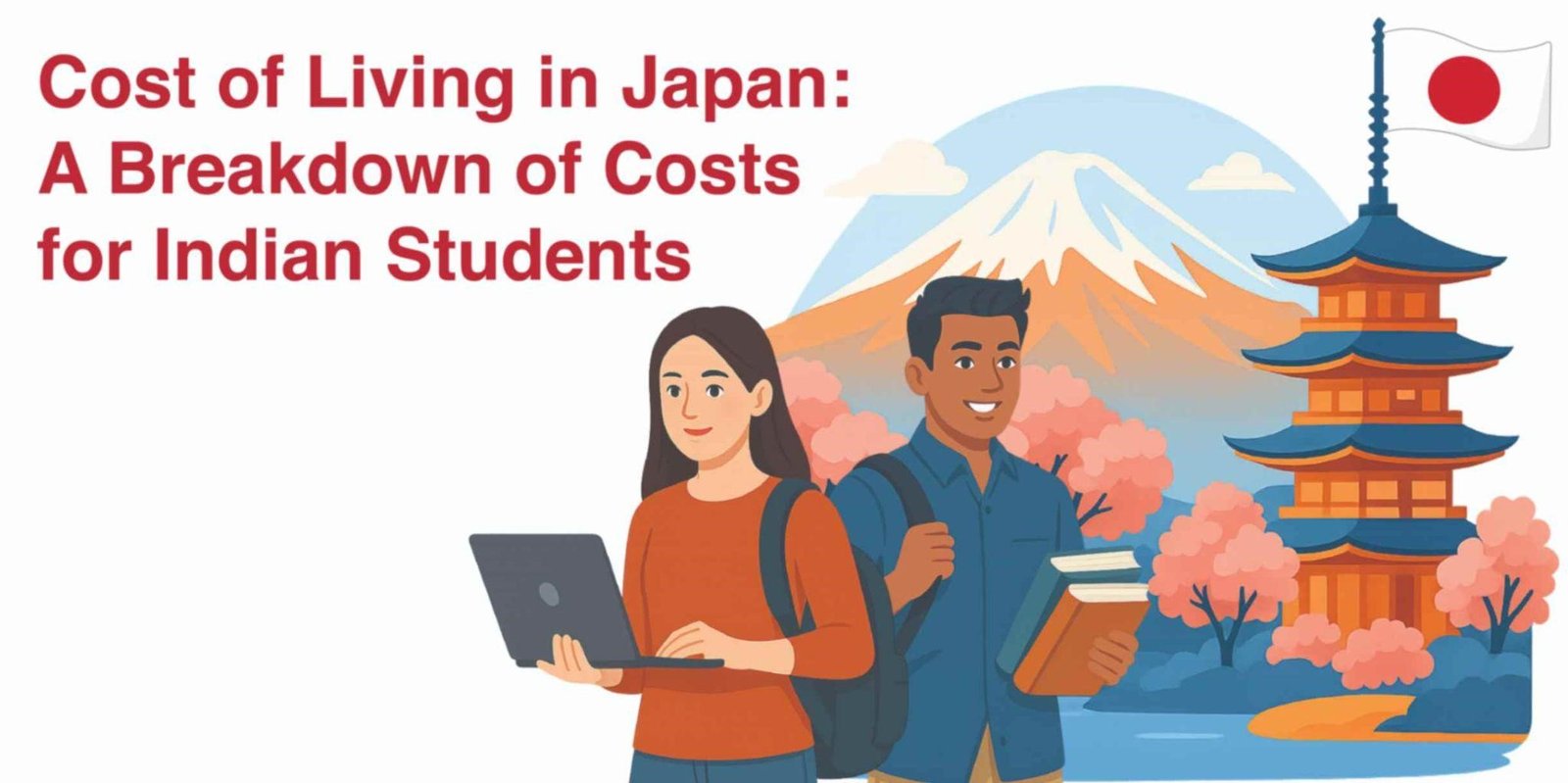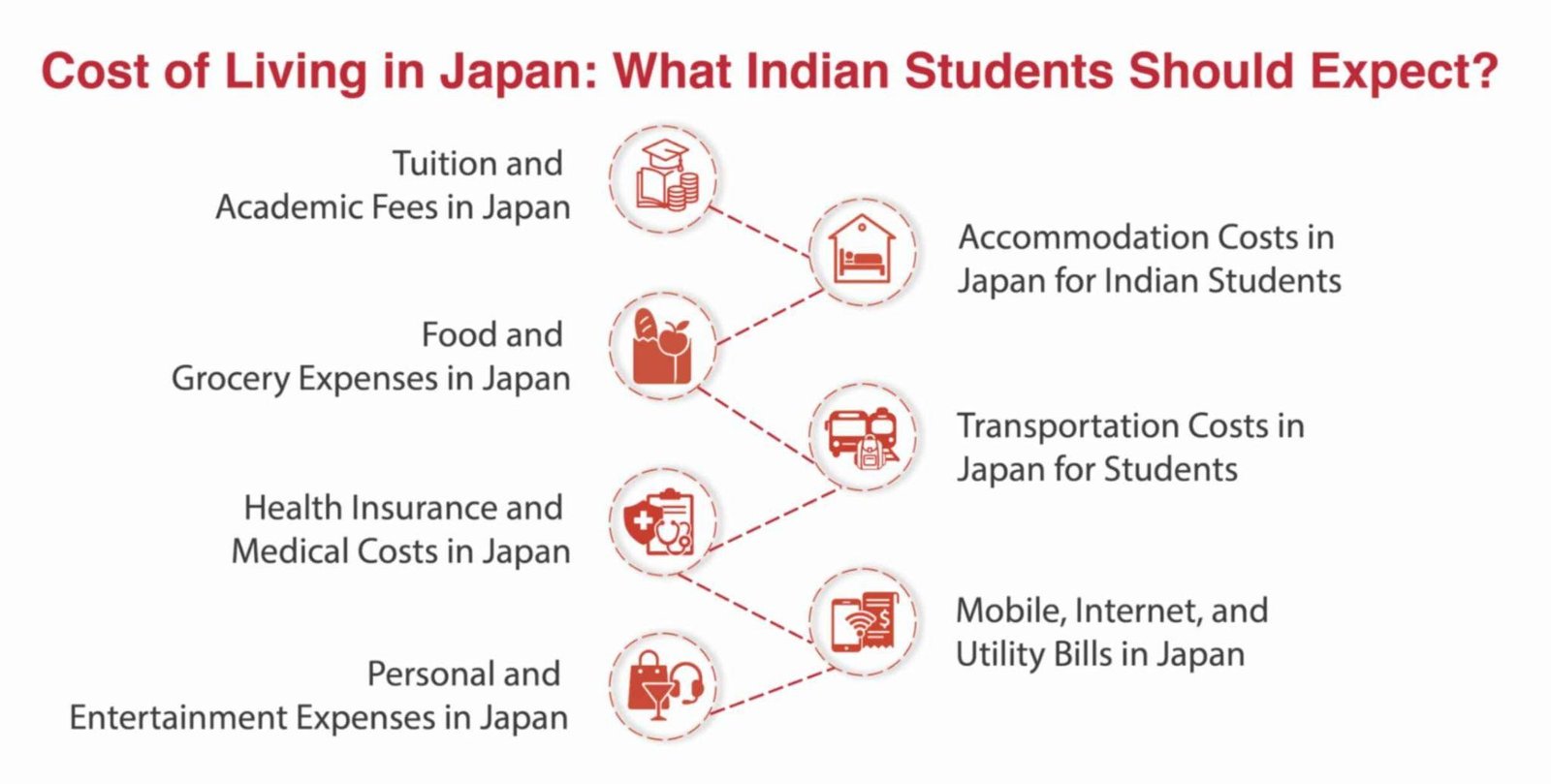Cost of Living in Japan: A Breakdown of Costs for Indian Students

Japan is increasingly becoming a favoured study destination for Indian students due to its high-quality education, technological advancement, cultural richness, and excellent safety standards. With a growing number of Japanese universities offering English-taught programs, especially in engineering, science, and management, students from India now have broader access to world-class education. Moreover, Japan's Work & Learn policies, part-time job flexibility, and post-study employment prospects make it an appealing choice for those seeking academic and career growth.
However, planning to study abroad also means understanding the financial commitment it entails. This blog provides a detailed breakdown of the cost of living in Japan, specifically for Indian students, and helps aspirants and their families make informed decisions.
Cost of Living in Japan: What Indian Students Should Expect?
The cost of living in Japan varies by city. While Tokyo and Osaka are among the most expensive cities, smaller cities such as Fukuoka or Sapporo are more affordable. On average, Indian students can expect to spend between JPY 80,000 and JPY 150,000 (approximately INR 44,000 to INR 83,000) monthly, excluding tuition. This estimate includes housing, food, transportation, and other personal expenses. Understanding these average living costs in Japan for international students in advance helps students budget more effectively and avoid financial stress during their study tenure.

1. Tuition and Academic Fees in Japan
Tuition fees in Japan are relatively moderate compared to Western countries. National universities charge lower fees, usually around JPY 535,800 (approximately INR 3.1 lakhs) annually, with an additional one-time admission fee of JPY 282,000 (around INR 1.6 lakhs). Private universities may charge higher, ranging from JPY 800,000 to JPY 1,500,000 (INR 4.4 to 8.3 lakhs) per year, depending on the course and institution.
In addition to tuition, there may be expenses for books, lab materials, and examination fees, typically ranging from JPY 10,000 to JPY 30,000 (INR 5,500 to INR 16,500) annually.
2. Accommodation Costs in Japan for Indian Students
Accommodation is often the most significant component of living expenses. Students can choose between university dormitories, private apartments, or shared housing.
University Dormitories: These are subsidized and cost-effective, ranging from JPY 15,000 to JPY 50,000 (INR 8,000 to INR 27,500) per month.
Private Apartments: These cost more, with monthly rents ranging from JPY 50,000 to JPY 80,000 (INR 27,500 to INR 44,000), depending on the city and location.
Shared Housing: Co-living spaces range from JPY 30,000 to JPY 60,000 (INR 16,500 to INR 33,000) per month and include utilities in many cases.
Initial costs like security deposits and key money can also apply, often amounting to one or two months' rent upfront.
3. Food and Grocery Expenses in Japan
The cost of living in Japan per month, especially food expenses, depends on lifestyle and eating habits. Cooking at home is the most budget-friendly option, costing around JPY 15,000 to JPY 25,000 (INR 8,000 to INR 14,000) per month.
Eating out occasionally can add another JPY 5,000 to JPY 10,000 (INR 2,750 to INR 5,500) to the budget. Convenience store meals and university cafeterias are affordable options, often offering complete meals for JPY 300 to JPY 600 (INR 165 to INR 330).
4. Transportation Costs in Japan for Students
Japan boasts one of the most efficient public transportation systems globally. Students often use trains, subways, and buses to get around.
Monthly transport passes for students range between JPY 3,000 to JPY 8,000 (INR 1,650 to INR 4,400), depending on the city and distance to the university. Bicycles are also a popular and economical choice for commuting short distances.
5. Health Insurance and Medical Costs in Japan
Health insurance is mandatory for international students. The National Health Insurance (NHI) scheme typically costs around JPY 1,500 to JPY 2,500 (INR 825 to INR 1,375) per month. It covers 70% of medical expenses, significantly reducing the burden of unforeseen medical emergencies.
Routine medical check-ups at university clinics are often free or minimally charged. Private insurance is optional but can offer additional coverage for specific needs.
6. Mobile, Internet, and Utility Bills in Japan
Connectivity and utility expenses are another important consideration:
Mobile Plans: Monthly charges range from JPY 2,000 to JPY 4,000 (INR 1,100 to INR 2,200) depending on data usage and provider.
Internet Services: Monthly broadband costs approximately JPY 3,000 to JPY 5,000 (INR 1,650 to INR 2,750).
Utilities: Electricity, gas, and water bills typically range from JPY 8,000 to JPY 12,000 (INR 4,400 to INR 6,600) monthly, though this can vary by season and usage.
7. Personal and Entertainment Expenses in Japan
Students should allocate a portion of their budget to personal care, clothing, leisure activities, and entertainment.
Movies, Travel, and Dining Out: JPY 5,000 to JPY 15,000 (INR 2,750 to INR 8,250) monthly.
Fitness and Hobbies: Gym memberships or club fees range from JPY 2,000 to JPY 7,000 (INR 1,100 to INR 3,850) per month
Spending habits vary, but maintaining a balance between study and recreation is essential for a healthy student life.
Part-Time Job Opportunities in Japan for Indian Students
International students in Japan can work up to 28 hours per week during academic sessions and up to 40 hours during vacations with a work permit.
Popular part-time jobs include:Convenience store staff
English conversation tutors
Restaurant assistants
Delivery personnel
Wages typically range from JPY 900 to JPY 1,200 (INR 500 to INR 660) per hour. These earnings can help cover a significant portion of monthly expenses.
Budgeting Tips for Indian Students Living in Japan
Track Your Expenses: Use budgeting apps to monitor spending.
Cook at Home: Reduces monthly food bills considerably.
Use Student Discounts: These are available on transport, events, and software.
Buy Second-Hand: Textbooks, bicycles, and furniture are often available at reduced prices.
Share Accommodation: Lower rent and utility costs with roommates.
By adhering to these tips, students can manage their finances more effectively and avoid overspending.
How does Bhrighu's Work & Learn Program in Japan help Indian Students?
Bhrighu Academy's Work & Learn Program provides a comprehensive platform for Indian students to study and earn simultaneously in Japan. Key features include:
Industry-Aligned Curriculum: Courses tailored to the Japanese market needs
Language Training: Japanese language skills to ease cultural and professional integration
Part-Time Job Assistance: Guidance in finding legal, student-friendly employment
Mentorship and Support: Regular check-ins and counselling
Internship Opportunities: With local firms to gain practical experience
The program ensures financial stability and skill development, offering a unique advantage to Indian students abroad.
Conclusion
Living and studying in Japan is a life-changing experience, offering cultural enrichment, global exposure, and academic excellence. However, it is essential to be aware of the cost of living in Japan and manage it wisely—every expense matters when budgeting as an international student, from tuition to groceries and part-time jobs.
With strategic planning and support from initiatives like Bhrighu Academy's Work & Learn Program, Indian students can thrive academically and financially in Japan.
Contact Bhrighu today to confidently explore your path to studying and working in Japan.
Frequently Asked Questions
Is Japan expensive for Indian students?
Japan can be moderately expensive for Indian students, especially in major cities like Tokyo. However, with smart budgeting, student discounts, and part-time work options, many Indian students manage their expenses effectively while enjoying a high standard of living.
Can you live in Japan with $2000 a month?
Yes, $2000 (approximately ¥300,000) per month is sufficient for an Indian student in Japan. This budget can comfortably cover accommodation, food, transportation, and personal expenses, especially in mid-sized or smaller cities.
Is 1 lakh yen a good salary in Japan?
For students, ¥100,000 (1 lakh yen) per month from a part-time job is reasonable and can cover most living expenses. However, it may not suffice for luxurious living in expensive cities without additional financial support.
Is it worth studying in Japan for Indian students?
Absolutely. Japan offers high-quality education, cutting-edge research opportunities, cultural diversity, and excellent job prospects. With part-time work options and growing English programs, it presents a valuable academic and career pathway for Indian students.
Can I study in Japan without knowing Japanese?
Yes, many Japanese universities offer English-taught programs, especially in science, engineering, and management. While Japanese language skills help with part-time jobs and daily life, they are not mandatory for academic success in select programs.






